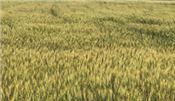|
What Has The Arkansas Wheat Crop Done In 2019?

Field of wheat ripening in Morrilton, Arkansas. Taken May 20, 2019.
U of A System Division of Agriculture photo by Mary Hightower
MARIANNA, ARK.
The dip in Arkansas wheat acreage over recent years was not halted in 2019. And if the price for the commodity was off-putting for growers, the latest growing season wasn't much better.
“Weather has an impact on the growth of any crop, of course,” said Jason Kelley, extension wheat specialist for the University of Arkansas System Division of Agriculture. “But for wheat it seems to have a greater impact. Think about the delays we’ve seen for the summer-growing crops with the wet spring this year – and even so, there’s a pretty wide window to plant soybeans.”
For wheat there’s about a month-long time frame that’s optimum for planting.
“Normally, we like to plant wheat in October,” said Kelley. “Last fall was terrible for not only harvest but for planting wheat. Most of our wheat will be planted behind soybeans or corn. If the weather delays those crops’ harvest – rutting up fields and it’s too muddy to do much – well, we aren’t going to plant a lot of wheat. December-planted wheat isn’t usually our top-yielding wheat, either.”
Arkansas’ wheat acres have been declining over the last several years. But the farmers who wanted to plant wheat last fall didn’t have much opportunity, said Kelley. “NASS’ latest numbers have the state at 60,000 acres. That’s a small fraction of the wheat we were growing 15 to 30 years ago and hitting that 60,000 might be a little shaky – especially with some lost acres in the Arkansas River Valley due to recent flooding.
“For the acres we did get in the ground, being timely with inputs is critical. In February and March, we struggled to get the wheat fertilized and weeds sprayed on time.
“I think many would agree that the years we typically have really good wheat yields there’s a dry March, April and May. This year we had record rainfall. We’ve been in a wet nine-month pattern.”
Northeast Arkansas’ Mississippi County experienced a wheat-growing season that “started out wet and ended wet,” said Shawn Lancaster, Mississippi County extension agent for the Division of Agriculture. “We’re seeing very low yields. What I’m hearing is anywhere from 35 bushels to 65 bushels is common. We had no disease or insect issues, it’s just that wheat doesn’t like wet feet.”
The Mississippi County wheat harvest just got started the week of June 10. “They were checking fields last week but the moisture level just got low enough to start,” said Lancaster.
Mississippi County’s experience is likely to be shared in other counties, said Kelley. “I think wheat is taking it on the chin this year. For the producers with wheat, I think the yields will be off as could be expected with all the rainfall. NASS has Arkansas wheat at a 60-bushel-per-acre yield. I tend to think that’s optimistic. We’ve had some fields in the 60- to 70-bushel range but that’s going to be hard to sustain statewide.”
Some wheat plots were harvested recently at the Lon Mann Cotton Research Station in Marianna, Kelley said. “Some of the results were better than expected but we certainly didn’t get the 100-bushel wheat we were hoping for, with top yields near 70 bushels per acre.”
The quality of this year’s wheat is also an issue, said Kelley. “Test weight discounts can get pretty steep. With all the rain, it wouldn’t be a surprise to see lower yields and test weights.
“On the bright side, the price of wheat has risen over the last few weeks for those looking to grow wheat this fall. The price for next June is currently near $5.50. That may help get some wheat acres back this fall.” ∆
|
|